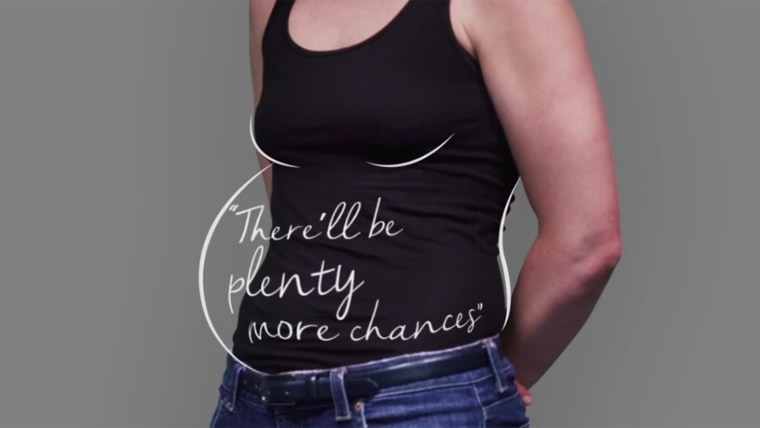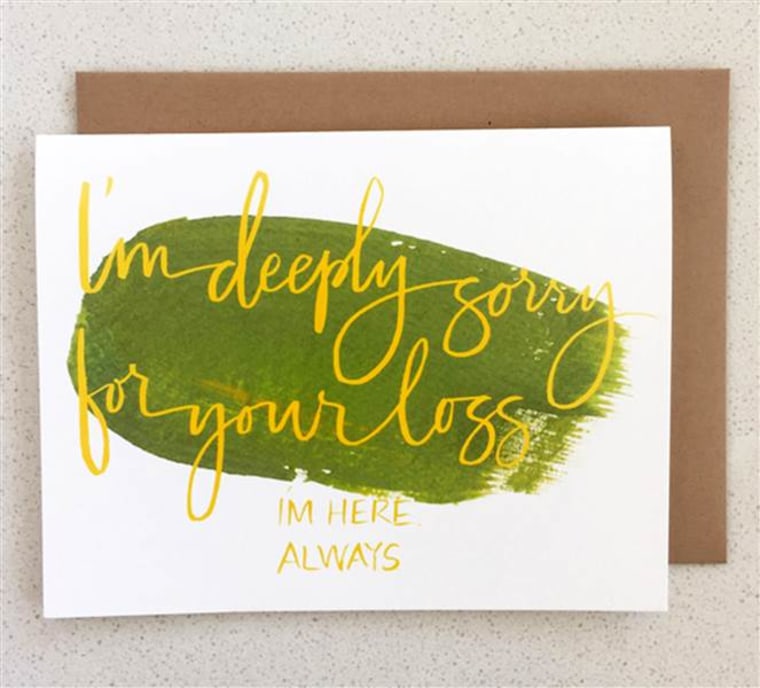"There'll be plenty more chances."
"It happened for a reason."
"At least it wasn't a real baby yet."
A miscarriage can be heartbreaking, and it's natural for friends to want to offer comfort. But as a UK-based charity points out in a new viral video, those well-intentioned words can be painful.
London-based Tommy's, which takes its name from St. Thomas' Hospital, funds research into stillbirth, premature birth and miscarriage. In a recent survey of 6,000 women who'd suffered a miscarriage, 95 percent reported hearing well-meaning but hurtful words from friends and family.
In the short and silent video, which has been viewed more than a million times on Facebook, five ill-advised phrases commonly heard after miscarriage float artfully over the photo of a woman, sketching out the pregnant shape she may never have fully realized.

"At least it happened early."
"At least you can get pregnant."
Rosie Houston, who experienced four miscarriages, told Tommy's how painful similar words were for her.
“I often felt frustrated at people’s responses, comments such as ‘They are so common,' ‘It will happen,’ or ‘At least it was early,'" Houston told the charity. "But I was so gutted and sad. People lose their parents but you’d never respond with ‘It happens.' Losing a baby at any stage of pregnancy is traumatic and all you really want to hear is ‘I’m so sorry.’”
Simply sharing your sorrow may feel inadequate, but there are other ways to deliver comforting words. A line of empathy cards for pregnancy loss was created by psychologist Dr. Jessica Zucker. "I'm deeply sorry for your loss. I'm here always," reads one card. Another reassures that "Grief knows no timeline. Take all the time you need."

Readers from the TODAY Parents Facebook page shared the words that comforted them most after pregnancy loss.
"Friends or coworkers reaching out and sharing their own miscarriage stories helped make me feel I wasn't alone and it was OK to talk about it," wrote Melissa Harper.
Heather Covey Heslin longed for communication, but acknowledged that certain words caused pain. " I hated hearing, 'it happened for a reason,' or 'there must have been something wrong with the baby,'" she wrote. "Those don't help at all, but I know people meant well. It also hurt that nobody wanted to talk about it. Everyone changed the subject anytime it was brought up. I just needed to be able to talk about it!"
On the Tommy's post, AJ Ferguson pointed out that mothers aren't alone in their grief. "(It's) very important to note that dads experience miscarriage and the feelings and emotions surrounding it too," Ferguson wrote.
And Elizabeth Ide posted that the hurtful comments generally come from a place of ignorance, not intentional pain. "I think it's important to try and remember people mean well and these things are said generally without malice," Ide wrote. "Society has created a stigma around miscarriage and by not talking about it, most people just don't know what to say to you when it happens. They want to say something to try and make you feel better and so these insensitive comments come pouring out."
Tommy's is using the social-media hashtag #MisCOURAGE to encourage open discussion of baby loss, and will fund the UK’s first national Miscarriage Research Center, set to open in April.